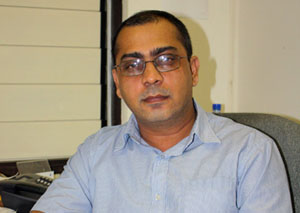
Parijata Gurdayal
SUVA (University of the South Pacific / Pacific Media Watch): Research evaluating the general state of investigative journalism in seven Pacific Island countries proposes collaboration between media, civil society organisations, academia, and other social institutes to help strengthen capacity.
The author, Shailendra Singh, is former divisional head of journalism at the University of the South Pacific and former editor of The Review news magazine. He points out that lack of resources in newsrooms, lack of training for journalists and repressive environments pose major constraints for investigative journalism in the Pacific.
Singh, who has widely researched and written on corruption and governance issues in Fiji and the Pacific, is a current doctoral candidate at the University of Queensland.
His paper, Investigative journalism: Challenges, perils, rewards in seven Pacific island countries, was published in the latest Pacific Journalism Review, a media research journal based at Auckland University of Technology's Pacific Media Centre.
The paper looked at the environment for investigative journalism in Fiji, Cook Islands, Papua New Guinea, Samoa, Solomon Islands, Tonga and Vanuatu.
It found a “discouraging trend” of harsher media legislation, harassment and beatings of journalists and false charges and lawsuits leveled against journalists and media organisations.
Singh writes that the Pacific media can overcome constraints by “working with the competition” on major stories and collaborating with other institutions central to Pacific Island life, such as community-based civil organisations, academia and religious bodies.
Opposing persecution
Churches, the study states, can speak out against the persecution of journalists and provide sanctuary when necessary since they wield a fair amount of moral authority and influence in the islands.
But despite the challenges, Pacific media has some comparative advantages, he suggests.
While newspapers may find it difficult to engage in investigative journalism due to daily deadlines and resource constraints, monthly-circulated magazines may have an advantage in this specialist area due to lower overhead costs and more time to work on stories.
Singh said Fiji’s Review magazine rose from obscurity and boosted its circulation with some major exposés, such as the National Bank of Fiji scandal in the 1990s. This gives magazines strong incentives to carry out investigative journalism to boost their circulations.
More recently, award-winning Fiji-journalist Stanley Simpson had exposed several suspect corporate dealings in the local magazine, Mai Life. But one drawback was that other Fiji news media did not pick up his stories.
Also, the study suggests trans-border cooperation between local media and overseas counterparts to expose issues suppressed by Pacific governments, such as the Samoan Observer and Television New Zealand joint investigation into Samoa’s baby adoption fraud involving American couples.
In places where journalists are shackled by harsh laws, Singh pointed out that information could be passed onto overseas news media for publication.
This work is licensed under a Creative Commons Attribution-NonCommercial 3.0 New Zealand Licence.




